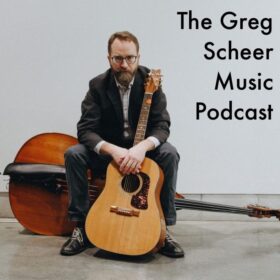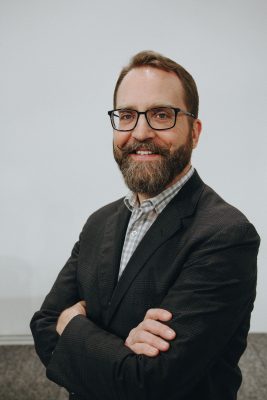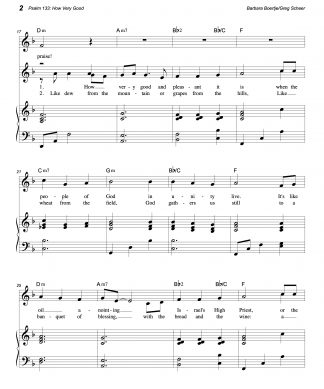
SYNOPSIS: Greg talks about his resolution for continuing growth in the new year, and challenges his listeners to join him.
TRANSCRIPT:
[jazz bass]
Oh, hello. I’m just practicing my bass. This is Greg Scheer for Greg Scheer Music, and this episode of my podcast is called “Continuing Ed: Lessons, Life, and Lydian Scales.”
So lately I’ve been playing a lot of jazz. I have a weekly jazz gig on Thursday nights— feel free to stop by and watch us. And that’s given me this desire to play better, to become a better bass player, to become a better jazz musician. So I’ve been thinking a lot about that.
One of the things that I did to become a better jazz musician was to take a lesson with a local pianist. He’s a really great jazz pianist and has taught jazz in the area. So, I actually played with him one Thursday night, and I said, “Hey, do you give lessons?” And he said, “Yes,” and so I took a lesson with him. Now, I have to tell you about this lesson. I have not had a lesson, a music lesson, in 20 or 30 years. It’s just been forever since I have had a lesson. So, I showed up at his house; I had a big stack of jazz songs that I had written and we were going to go through those. And I realized I was perspiring as I was getting ready to take this lesson. I was just really nervous about it.
And I was telling another pianist, the pianist who normally plays on Thursday nights. I was telling him about this, and I said, “Oh, I took a lesson with our mutual friend.” And he said, “Really? How’d that go?” And I said, “Well, I was so nervous.” And he says, “Why were you nervous?” And I said, “Why wouldn’t I be nervous?” Now, you have to understand, this pianist is very extroverted, and I am not, and I think that that would be a lot of why I would be nervous about taking a lesson and he would just kind of go into it.
But I, what I explained to him is that the reason that I was nervous about taking this lesson is because when you take a lesson from somebody, you’re essentially telling them what you don’t know. You’re exposing your faults, especially when this is someone that I play with around town somewhat frequently. It’s a pretty vulnerable thing to stop time and let them hear what you can do and what you can’t do, and let them know all your weaknesses.
The fact is that none of us want to be found out to be a fraud, but most of us are worried about that very thing. We’re just, I don’t know about you, but this is where our nightmares come from. You know, some people have the nightmare about speaking in front of a crowd and they’re naked. I usually have these nightmares where I am woefully unprepared for whatever concert that I am supposed to be doing, and I’m, in my dream, all night long, I’m running home to get a tuxedo, and then I come back to the place and I realize I haven’t brought my bass, and on and on it goes. None of us want to be exposed and shamed in that kind of way.
So, while we all have that reflex, that kind of shame reflex, that wants to hide, and wants to not expose our weaknesses, the fact is that the only way to improve is to admit what we don’t know. None of us wants to be the person in the room that doesn’t get a joke, the only one that’s not laughing at a particular joke because we don’t know a word that a person used in the joke, or a historical character. And we think, “Oh my goodness, everybody knows this historical character but me.”
And so, the reality is that we need to— our desire for growth needs to be greater than our sense of shame. We have to want to grow and to learn more than we want to protect our image and keep our image intact from people knowing that we have weaknesses and that we sometimes fail. So, the other thing about this, this kind of commitment to learning and this commitment to growth. . . And I would say that it’s also simultaneously a commitment to failure, because that’s part of growth, is failing and getting back up and trying to do things again.
So, part of that commitment to growth is that it helps us from being a one trick pony or becoming a cranky old curmudgeon. So what do I mean by this? Well, in our 20s and maybe into our 30s we tend to, that’s a time of growth for us. We’re in school, we’re learning, we’re young enough that it’s not shameful to admit the things that we don’t know. And we tend to have people around us that are able to, you know, teachers who will be able to help us in our growth. But I’ve seen so many people, especially in the world of worship, where they get through their kind of college years, that kind of formative time in their 20s, and they haven’t learned anything but the one thing that they know. And then when they become 30 or 40, styles change, times change, and suddenly their church wants them to do something that is not in their sweet spot, and they don’t know what to do.
And I’ve seen many people, as they get into their 40s, instead of re-envisioning themselves as a different kind of person or a broader person, one who is conversant in a broader array of styles, they just say, “Okay, well, I’m going to be a legacy person. I’m going to quit this job and I’m going to go to a job where people in my demographic appreciate what I do.” And that’s just sad, that so many people have not been able to retool themselves to work, and to continue to work over the years in a particular ministry or a particular music style.
The other thing that learning does is it keeps us from being a cranky old curmudgeon. You know, the musical version of the person who sits on his lawn, and sits on a chair and says, “Get off my lawn, kids!” You know, if you don’t expand your range and expand your mind and continue to grow, then you have to hunker down and protect the little thing that you have. So, I’m a person who really encourages people to commit to growth.
One of the things, for example, in some of my books that I’ve talked about, is that I think that every worship leader should have some kind of musical experience outside of church. So, for example, for a number of years, especially early on when I was conducting choirs in churches, I was in a top class choir in Pittsburgh. And I was just a singer in that group. Every once in a while I would lead some sectionals and things like that. But mostly, I was just a singer. And I was there because I wanted to learn how to sing better, I wanted to observe a really good conductor. How do they run a rehearsal? What do they ask for? What are the ways that they get the things that they want? That was a really important thing.
I know other worship directors who might be jazz musicians, and they work outside of the church in that area. And the reason I think it’s so important is because, if you don’t have some kind of musical avenue outside of what you do in the church. In a church setting, you’re almost always pulling people along with you. You’re usually the best musician in the room, and you’re pulling people along with you. You need to be in a situation where you’re not the best musician in the room, where you feel uncomfortable, because other people know things that you don’t. They’re able to do things that you can’t do, and you have to scramble to keep up. That’s where the real growth happens.
So, as we come into a new year, I am once again committing to growth. For example, I just emailed a bass player who I admire a lot. I’ve heard him play, and I’ve asked if he would give me lessons. I’ve just bought a five string bass, and so I’m learning the five string bass. If any of you are four string bassists, and you’ve switched to the five string, you know how awkward that can be because you’re constantly reaching for the wrong string. So I’ve committed to learning the five string bass and the way that that instrument will expand my palette. I’m practicing scales, I’m reading books, I’m asking questions. I wanna be the guy that asks the stupid questions, but then learns the answer to it, and can incorporate it into my growth.
So my question, as we come into this new year, is, what area of growth are you going to commit to? So, think about it. What is your weak area? You know, they always talk about “what is your growing edge?” So, what is your growing edge? What is the place musically, or spiritually? Is there a class you could take, are there lessons you could take, a book you could read? Is there some way that you could put yourself in that kind of, anxiety-inducing place that is so, such a fertile area for growth?
And so that is simply my admonition to you, my Greg Scheer Music Podcast listeners, is that in this coming year, you take some time to think about where is it that you would like to grow?
That’s all I’ve got for you this week. I will talk to you later.
[jazz bass]



